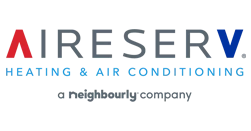Breathe Easy With Aire Serv
Heating and air conditioning units are commonly overlooked when checking the safety of any home. However, improper heating and air conditioning system maintenance could lead to problems such as carbon monoxide poisoning and electrical fires. Simple changes to your home HVAC maintenance routine could help you effectively prepare for winter weather, keep your pets safe, and prevent carbon monoxide poisoning.
Simple Safety Measures
Loose connections in heat pump units could lead to electrical fires. Broken or defective pilot lights and heat exchanger leaks on your furnace could lead to carbon monoxide poisoning. Serious problems could arise from blocked or faulty boiler pressure release valves as well.
Some simple safety measures could help prevent problems:
- Clean your air filters: Clean filters at least every three months to prevent carbon monoxide fumes from leaking into your home.
- Install carbon monoxide and smoke detectors: Carbon monoxide gas is virtually impossible to detect without the help of a device. Check all detectors monthly and change batteries yearly.
- Keep children and pets out of hazardous areas: Prevent dangerous burns or injuries by keeping children and pets away from rooms with furnaces or boilers.
- Set up annual maintenance: Professional heating and AC technicians can identify potential problems with your system and prevent problems or injury.
In case of severe or inclement weather, further tips may be of help in ensuring your home’s safety.
Prepare for dangerous weather with the following tips:
- Expect the unexpected: Don’t wait until an emergency strikes, prepare for power failures and other problems by learning how your heating and AC system function.
- Teach electrical safety: During a power outage, turn off power to your heating and AC equipment to prevent harmful electricity spikes. Know how to operate your breaker controls.
- Use surge protectors: If you are away when a power outage strikes, a surge protector can automatically cut power to your heating and AC system. This will protect your equipment.
- Call professionals after disaster: Floods, hurricanes, and other disasters can cause dangerous complications to using your HVAC system. Professionally inspect it before turning on power.
For further safety tips and information, or to schedule an appointment with Aire Serv, call us!
 Click to call
Click to call


